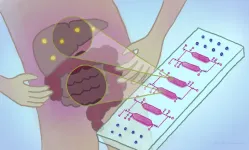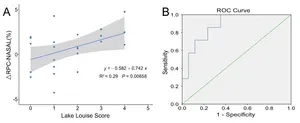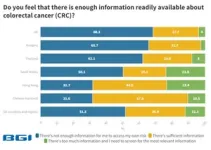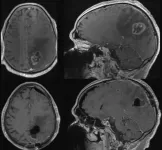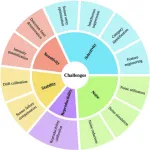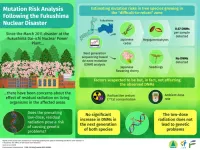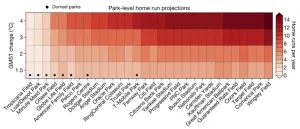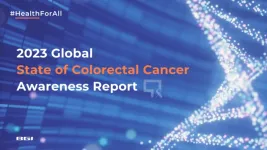(Press-News.org) A new chip that holds different cell types in tiny, interconnected chambers could allow scientists to better understand the physiological and disease interactions between organs. The integrated-gut-liver-on-a-chip (iGLC) platform was designed by scientists at Kyoto University’s Institute for Integrated Cell-Material Sciences (iCeMS), to improve understanding of non-alcoholic fatty liver disease (NAFLD). The researchers, together with colleagues in Japan, published their findings in the journal Communications Biology.
“NAFLD affects a significant percentage of the population, but no effective treatments have been established,” explains iCeMS bioengineer Ken-ichiro Kamei, who led the study. This is because NAFLD is a complex condition, involving a wide range of interactions inside and between the gut and the liver, known as the gut-liver-axis. It is very difficult to model these interactions using animals, such as mice, due to the many differences between species.
NAFLD involves the build-up of fat inside the liver, which can become severe. Currently, the only way to treat severe cases is with liver transplantation. Scientists need better approaches to study the condition to be able to discover improved options for treatment.
This isn’t the first time scientists have developed organ-on-a-chip platforms, nor is it the first gut-liver platform, but previous devices have been imperfect. The platform developed by Kamei and his colleagues overcomes some but not all the issues with previous attempts.
The scientists tested their iGLC platform by placing cells from a liver cancer cell line and from a gut cancer cell line into separate chambers. The chambers are connected by tiny fluidic channels with strategically positioned valves that can be opened and closed. The platform also includes a pump for pushing fluid between the chambers. They allow a fluid medium to pass through both chambers while keeping the cells separate, mimicking the circulation moving between the gut and liver in the human body. It also allows the scientists to introduce new substances into the platform for example free fatty acids to test their impacts on the two interacting “organs”.
Importantly, the platform is made of a silicone material, called polydimethylsiloxane (PDMS), that is coated with two other substances: one that prevents the chip from absorbing fatty molecules that could affect experiments, and another that increases cell growth.
Significant changes in gene expression were seen in gut and liver cells cultured in the iGLC platform when compared to the same cells cultured on their own. The scientists also documented the specific changes that happened in the cells when free fatty acids were introduced for one or seven days. One day of free fatty acids led to the initiation of DNA damage inside the cells. Seven days of circulating free fatty acids led to their accumulation in the cells to the point that the DNA damage led to cell death, similar to severe cases of NAFLD.
The platform does not take into account the impacts of gut microbes or other factors on the gut-liver-axis. The experiments also used cancer cell lines, which don’t represent the full diversity or functionality of cells in living human tissue, but the platform is a significant step forward.
“We next plan to use liver and gut organoids derived from human stem cells so we can investigate NAFLD under precisely controlled conditions that more closely mimic patients’ physiological contexts,” says iCeMS mechanical engineering researcher, Yoshikazu Hirai, the study’s corresponding author.
###
https://doi.org/10.1038/s42003-023-04710-8
About Kyoto University’s Institute for Integrated Cell-Material Sciences (iCeMS):
At iCeMS, our mission is to explore the secrets of life by creating compounds to control cells, and further down the road to create life-inspired materials.
https://www.icems.kyoto-u.ac.jp/
For more information, contact:
I. Mindy Takamiya/Christopher Monahan
cd@mail2.adm.kyoto-u.ac.jp
-----
Please download the images and related files:
https://drive.google.com/drive/folders/17tsHLUg6Pd4BMlNsJPUaDYSmElurM3ou?usp=sharing
END
Two-organ chip to answer fatty liver questions
A tiny platform empowers scientists to examine how gut and liver cells interact in health and disease
2023-04-07
ELSE PRESS RELEASES FROM THIS DATE:
Retinal microvasculature is a potential biomarker for acute mountain sickness
2023-04-07
This study is led by Dr.Ningli Wang and Dr.Yuan Xie (Beijing Tongren Hospital, Capital Medical University), they provide evidence that retinal microvasculature is a potential biomarker for cerebral microvasculature changes and acute mountain sickness(AMS) development during risk assessment of individuals at high altitudes.
Since the retinal and cerebral vasculature share many morphological and physiological characteristics, direct evaluation of the more accessible retinal vasculature should theoretically provide insights into the cerebral circulation. Therefore, the role of retinal imaging ...
Researchers leverage cell self-destruction to treat brain tumors
2023-04-07
CHAPEL HILL, N.C. – Glioblastoma is the most common type of brain tumor in adults. The disease is 100% fatal and there are no cures, making it the most aggressive type of cancer. Such a poor prognosis has motivated researchers and neurosurgeons to understand the biology of tumors with the goal of creating better therapies.
Dominique Higgins, MD, PhD, an assistant professor in the Department of Neurosurgery, has heeded the call. Higgins and a team of researchers at Columbia University have found ...
Deaths by suicide increase significantly during the week of a full moon
2023-04-07
INDIANAPOLIS—For centuries, people have suspected a full moon in the sky to cause mysterious changes in people. Now, psychiatrists at Indiana University School of Medicine have found deaths by suicide increase during the full moon.
“We wanted to analyze the hypothesis that suicides are increased during the period around full moons and determine if high-risk patients should be followed more closely during those times,” said Alexander Niculescu, MD, PhD.
Niculescu and his team looked at data from the Marion County coroner’s ...
How to make electronic noses smell better
2023-04-07
Imagine if you could ask a machine to “smell” something for you with just a click of a button. That’s what electronic noses, or e-noses, are for. They are systems that combine chemical gas sensors, signal processing and machine learning algorithms to mimic the sense of smell. E-noses can be used for many purposes, such as checking food quality, monitoring air pollution, diagnosing diseases and detecting explosives. How do they work? What are the challenges and opportunities in this field? A team led by Jingdong Chen of Northwestern Polytechnical University in Xi’an, China and ...
Study assesses risk of mutation due to residual radiation from the Fukushima nuclear disaster
2023-04-07
Ionizing radiation from nuclear disasters are known to be harmful to the natural environment. The Fukushima Dai-ichi Nuclear Power Plant meltdown that occurred in 2011 is a prominent example of such a disaster in recent memory. Even a decade after the incident, concerns remain about the long-term effects of the radiation. In particular, it is not clear how the residual low-dose radiation might affect living organisms at the genetic level.
The brunt of the disaster is usually borne by the floras inhabiting the contaminated areas since they cannot move. This, however, makes them ideal for ...
Simple but revolutionary modular organoids
2023-04-07
A team led by Masaya Hagiwara of RIKEN national science institute in Japan has developed an ingenious device, using layers of hydrogels in a cube-like structure, that allows researchers to construct complex 3D organoids without using elaborate techniques. The group also recently demonstrated the ability to use the device to build organoids that faithfully reproduce the asymmetric genetic expression that characterizes the actual development of organisms. The device has the potential to revolutionize the way we test drugs, and could also provide insights into how tissues develop and lead to ...
New book explores possibilities of colonizing planets, moons and beyond
2023-04-07
Dan Răzvan Popoviciu new book New Worlds: Colonizing Planets, Moons and Beyond (published by Bentham Science) explores the possibilities of transforming humanity into a multi-planetary species, while also sounding an alarm about our long-term future. It emphasizes the importance of efficiently using Earth's resources and expanding beyond the planet's borders.
In the book, Popoviciu discusses how various planets, moons, and asteroids in the Solar System can provide important resources and become potential new home worlds for humans. The author goes beyond simple colonization and discusses solutions for terraforming ...
Spike in major league home runs tied to climate change
2023-04-07
In the history of Major League Baseball, first came the low-scoring dead-ball era, followed by the modern live-ball era characterized by power hitters such as Babe Ruth and Henry "Hank" Aaron. Then, regrettably, was the steroid era of the 1990s and early 2000s.
Now, could baseball be on the cusp of a "climate-ball" era where higher temperatures due to global warming increasingly determine the outcome of a game?
A new Dartmouth College study suggests it may be. A report in the Bulletin of the ...
Disease history doubles rate of colorectal cancer screening for family members | BGI Insight
2023-04-07
To uncover attitudes and the biggest challenges facing colorectal cancer (CRC) awareness and screening, BGI Genomics today released its State of Colorectal Cancer Awareness Report, marking the first-ever global survey report on the world's third most common cancer. This report is released on World Health Day, April 07, 2023, in line with achieving Health For All, and seeks to motivate action to tackle the health challenges of today and tomorrow.
This ...
Cedars-Sinai heart experts elected to lead, join prominent medical societies
2023-04-07
Two Smidt Heart Institute experts have been honored for their contributions to medical research by being inducted into select medical societies, while a third expert has been selected for a leadership position.
Cardiologist, echocardiographer and clinician-scientist Susan Cheng, MD, director of Cardiovascular Population Sciences in the Smidt Heart Institute and the Erika J. Glazer Chair in Women’s Cardiovascular Health and Population Science, has been elected to the American Society for Clinical Investigation (ASCI) Council. ASCI is regarded as the most prestigious ...
LAST 30 PRESS RELEASES:
Study: Reported crop yield gains from breeding may be overstated
Stem cells from human baby teeth show promise for treating cerebral palsy
Chimps’ love for crystals could help us understand our own ancestors’ fascination with these stones
Vaginal estrogen therapy not linked to cancer recurrence in survivors of endometrial cancer
How estrogen helps protect women from high blood pressure
Breaking the efficiency barrier: Researchers propose multi-stage solar system to harness the full spectrum
A new name, a new beginning: Building a green energy future together
From algorithms to atoms: How artificial intelligence is accelerating the discovery of next-generation energy materials
Loneliness linked to fear of embarrassment: teen research
New MOH–NUS Fellowship launched to strengthen everyday ethics in Singapore’s healthcare sector
Sungkyunkwan University researchers develop next-generation transparent electrode without rare metal indium
What's going on inside quantum computers?: New method simplifies process tomography
This ancient plant-eater had a twisted jaw and sideways-facing teeth
Jackdaw chicks listen to adults to learn about predators
Toxic algal bloom has taken a heavy toll on mental health
Beyond silicon: SKKU team presents Indium Selenide roadmap for ultra-low-power AI and quantum computing
Sugar comforts newborn babies during painful procedures
Pollen exposure linked to poorer exam results taken at the end of secondary school
7 hours 18 mins may be optimal sleep length for avoiding type 2 diabetes precursor
Around 6 deaths a year linked to clubbing in the UK
Children’s development set back years by Covid lockdowns, study reveals
Four decades of data give unique insight into the Sun’s inner life
Urban trees can absorb more CO₂ than cars emit during summer
Fund for Science and Technology awards $15 million to Scripps Oceanography
New NIH grant advances Lupus protein research
New farm-scale biochar system could cut agricultural emissions by 75 percent while removing carbon from the atmosphere
From herbal waste to high performance clean water material: Turning traditional medicine residues into powerful biochar
New sulfur-iron biochar shows powerful ability to lock up arsenic and cadmium in contaminated soils
AI-driven chart review accurately identifies potential rare disease trial participants in new study
Paleontologist Stephen Chester and colleagues reveal new clues about early primate evolution
[Press-News.org] Two-organ chip to answer fatty liver questionsA tiny platform empowers scientists to examine how gut and liver cells interact in health and disease
